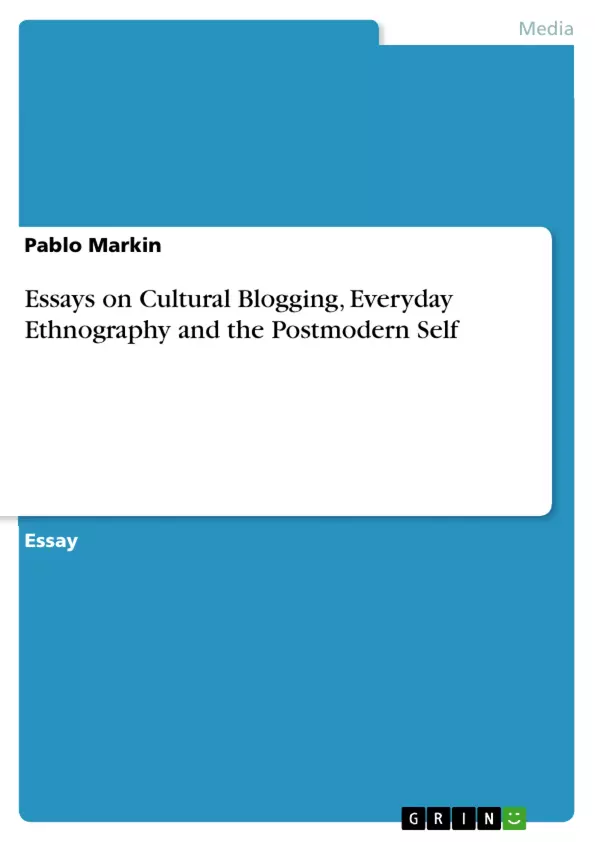In this collection of essays, I publish my postings into a blog that grew side-by-side with my other research initiatives in 2007. As blogging goes mainstream, so grew my sense that what I have put together earlier to follow through on my intuitions at the time may deserve to be published in an e-book format.
Inhaltsverzeichnis (Table of Contents)
- Blog-Writing as Communicative Medium for Personal Ethnography of the Second Modernity
- Moment of Ethnographic Writing as Departure Point of Recollection
- Cinematic Memory as Second Modernity's Arcades
- From Space to Time and Back Again on the Transit Lines of Memory
- The End of Enlightenment from Derrida's Perspective on Sings: The Case of Artistic Archive
- Documenta Archive as Structure of Allegorical Memory
- Documenta's Relevance to the International Art Biennials as Instances of Dealing with Artistic Archives
- The Position of Modernism in Between First and Second Modernity as Material, Social, and Discursive Process
- On Baudrillard's Obituary: Front Page News From the French Intellectual Field
- Spaces of Utopia Under the Theoretical Scrutiny of Post-Marxist Gaze
- Marx and After in the Look at Theoretical Filiation from Marxism to Post-Structuralism
- Spaces' Significance as Ruin of Their Signification: From Space to Theory and Back Again
- New York as Predictive City for the Second Modern Moment
Zielsetzung und Themenschwerpunkte (Objectives and Key Themes)
This collection of essays is comprised of blog posts from the year 2007, which explore the possibilities of personal ethnography in the context of the second modernity, specifically focusing on the urbanized self and cultural cartography. The author examines the role of writing as a medium for personal ethnography and how the second modernity, with its emphasis on technology and globalization, has redefined our understanding of subjectivity. The key themes explored in the essays include:- The relationship between personal experience and ethnographic writing
- The limitations and possibilities of "liberating" memory through writing
- The role of technology and media in shaping our understanding of space, time, and memory
- The impact of the second modernity on the modern symbolic order
- The potential for weblogging as a disruptive technology for writing and scholarship
Zusammenfassung der Kapitel (Chapter Summaries)
The first essay, "Blog-Writing as Communicative Medium for Personal Ethnography of the Second Modernity," explores the author's personal reflection on the therapeutic potential of writing and the ways in which it can be used to explore the complexities of memory and subjectivity. The author draws parallels between the writing of Karl Marx and Friedrich Engels and the contemporary project of "normalizing" our subjectivities in the field of writing, society, and space. The author proposes that second modern ethnography can offer a way to escape the limitations of traditional scholarly writing and explore the possibilities of a more personal and public form of knowledge production. The second essay, "Moment of Ethnographic Writing as Departure Point of Recollection," delves further into the idea of memory as a site of both liberation and constraint, examining how writing can both reveal and obscure our inner experiences. The author explores the concept of "cinematic memory" as a way to understand how the second modernity shapes our understanding of the past and our place in the present. "From Space to Time and Back Again on the Transit Lines of Memory" explores the relationship between space, time, and memory in the context of the urbanized self. The author examines how our movement through space, both physical and virtual, shapes our perception of time and our recollection of the past. The essay concludes by suggesting that the second modernity has fundamentally altered our relationship to time and memory, leading to a sense of fragmentation and disorientation.Schlüsselwörter (Keywords)
The essays in this collection focus on the intersection of personal experience, ethnography, and the second modernity. The key keywords include: personal ethnography, second modernity, urbanized self, cultural cartography, memory, writing, technology, weblogging, subjectivity, and space.Frequently Asked Questions
What is the focus of the essays in this collection?
The essays explore personal ethnography in the context of "second modernity," focusing on the urbanized self, cultural cartography, and the role of technology in shaping subjectivity.
How is blogging used as a research tool in this work?
Blogging is viewed as a communicative medium for personal ethnography and a disruptive technology that allows for a more personal and public form of knowledge production compared to traditional scholarship.
What is meant by "cinematic memory"?
Cinematic memory is a concept used to understand how the second modernity and its media shape our understanding of the past and our perception of time and space.
What are the key themes regarding space and time?
The essays examine how movement through physical and virtual spaces shapes our perception of time, leading to a sense of fragmentation and disorientation in the second modernity.
Which intellectual figures are discussed in the essays?
The collection references thinkers like Jean Baudrillard, Jacques Derrida, Karl Marx, and Friedrich Engels in the context of post-structuralism and cultural theory.
- Citation du texte
- Dr Pablo Markin (Auteur), 2010, Essays on Cultural Blogging, Everyday Ethnography and the Postmodern Self, Munich, GRIN Verlag, https://www.grin.com/document/140497



